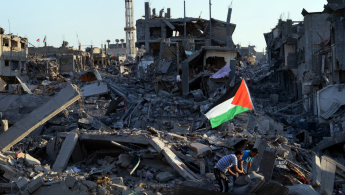Amnesty: Israel committed war crimes in Gaza
Israel committed war crimes and displayed "a shocking disregard" for civilian lives, Amnesty International said in a damning report on Israel's 50-day summer war on Gaza released on Wednesday.
The report, Families under the rubble: Israeli attacks on inhabited homes, focused on eight cases where Israel attacked residential homes in Gaza "without warning", leading to the deaths of at least 104 civilians, including 62 children.
In total, the report found that more than 1,500 Palestinian civilians, a third of whom were children, were killed, and 18,000 homes were destroyed or rendered uninhabitable as a result of Israeli attacks.
"Israeli forces have brazenly flouted the laws of war by carrying out a series of attacks on civilian homes, displaying callous indifference to the carnage caused," said Philip Luther, director of the Middle East and North Africa Programme at Amnesty International.
|
|
|
Israeli forces have brazenly flouted the laws of war by carrying out a series of attacks on civilian homes. - Philip Luther, Amnesty International |
Some of the cases documented in the report of homes destroyed may have been identified by Israel as military targets, Amnesty said, but Israel gave no warning to Palestinian civilians to flee the properties, meaning that Israel had not taken every feasible precaution - something Amnesty labelled as "deeply flawed and fundamentally at odds with the principles of international humanitarian law".
Israel had claimed during the attack on Gaza, which it named Operation Protective Edge, that Palestinians were warned before an attack, either through a phone call, or by shooting a smaller missile at the building to warn of a forthcoming larger missile - the now infamous "knock on the roof".
|
Gaza's Civilian Deaths |
|
|
Al-Hallaq and Ammar families, 20 July 2014, Gaza City, |
In the other cases, Amnesty was unable to identify any possible legitimate target, and therefore the attacks had "directly and deliberately targeted civilians or civilian objects", which fits the legal definition of a "war crime".
Amnesty also criticised Palestinian armed groups, and also called their firing of rockets into Israel - which killed six civilians including one child - a war crime.
However, the Israeli reaction to this was labelled as "grossly disproportionate" by the London-based human rights group.
Israel has rejected the findings of the report, saying that Amnesty had provided "no evidence" for its claims, and ignored "documented war crimes" committed by Hamas. A statement from Israel's foreign ministry said the report would serve "as a propaganda tool for Hamas and other terror groups".
The Israelis have denied investigators from Amnesty and other human rights organisations official access to Gaza. Despite this, Amnesty's field workers were able to collect evidence and speak to witnesses on the ground in the embattled strip.





 Follow the Middle East's top stories in English at The New Arab on Google News
Follow the Middle East's top stories in English at The New Arab on Google News


